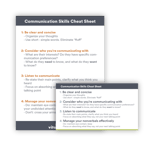 When it comes to communication between a manager and their team, there is always room for improvement. Improving workplace communication across your organization should be a goal for every business leader, and one that brings increased productivity to your team. When it comes to being a manager, having the ability to communicate effectively is one of the most important skills to have.
When it comes to communication between a manager and their team, there is always room for improvement. Improving workplace communication across your organization should be a goal for every business leader, and one that brings increased productivity to your team. When it comes to being a manager, having the ability to communicate effectively is one of the most important skills to have.
Billionaire businessman Warren Buffet told a classroom of business students that being an effective communicator doubles your value in the workplace. Buffet said that he would give $100,000 to any student in the room in exchange for 10 percent of their future earnings. And if the student was an effective communicator, he would increase the bid by 50 percent because the investment had more value.
It's a common misconception that powerful communication skills come naturally to some, and that they can’t be taught. This couldn’t be farther from the truth. Anyone who makes an effort to be mindful about the way they’re communicating in the workplace can improve their skills with a few helpful tips.
Along with this article, we’ve created a simplified “communication skills cheat sheet” to remind you of these communication skills throughout the day.
We’ve included 2 versions of the cheat sheet: a notecard sized version to keep by your desk, and a letter sized version to refer to on your devices or print out.
Improve your listening Skills
An Effective Communicator is an Expert Listener
A key difference between an effective communicator and a poor one is the value that each person places on listening. Improving your workplace communication skills starts with being a better listener.
The most important aspect of listening is also the most simple: Instead of waiting for your next opportunity to speak, make a concerted effort to absorb everything your employee is saying before thinking of your response. Although this may seem obvious, it’s something we all do from time to time.
Do you genuinely care about what your team members are telling you? Show them.
As a manager, it’s important to demonstrate solid listening skills for a number of reasons:
- When employees feel “heard” they’re more likely to take risks with the ideas they voice
- You don’t have all the answers – seeking new opinions and perspectives is always a good idea
- When you demonstrate positive listening skills your team members are more likely to follow suit
Here are some key differences between an effective listener, and an ineffective listener.
Effective listeners:
- Pay attention to the message.
- Listen open-mindedly.
- Convey through body language and eye contact that they are listening and open to the message.
- Concentrate on what the other party is saying.
- Don’t interrupt.
- Respond with thoughtful questions.
Ineffective listeners:
- Are disengaged.
- Assume that they already know and understand what the other party is saying.
- Convey that they are checked out of the conversation with their body language.
- Interrupt.
- Are distracted.
Listening is one of the essential communication skills that no manager should ignore. When managers start every professional interaction with effective listening, they build a strong foundation for future communication.
Organize your Thoughts – Be Clear and Concise
Think before you speak to guide the interpretation of your message
One of the biggest communication mistakes made not only in the workplace, but also in life is speaking before you’ve thought through your words. One of the most important communication skills for managers is being able to effectively organize thoughts, and to deliver them in a way that is easy to understand.
Here are some things to think about when crafting a message:
- The goal of your message
- How your message impacts others
- The key points you want to convey
- What tone you’re using
There are definitely times when speaking freely without these constraints can be beneficial. For instance, when you’re in the early stages of brainstorming with your team or openly discussing solutions to a pervasive issue. Dumping all of your thoughts about a problem out at once can provide solutions you may not have thought about before.
Where this becomes a problem, however, is when there’s a specific goal you’re trying to achieve with your message. Are you having a feedback conversation with a team member? Organizing your thoughts can help them better understand where you’re coming from, and areas they can improve upon. If you simply share all of your general thoughts, your specific points of feedback will get lost in the mix.
Use short and simple words – avoid “fluff”
Using simple and straightforward language can ensure that your messages are easily understood and leave no room for misinterpretation.
In written communication – this tip is extra important. In a study of over 40 million emails, Boomerang discovered that emails with 75-100 words had the highest response rate.
We’ve all been there: you receive an email, notice how long it is, and either skim through it or move it to a “to-do” folder to deal with later. On the flip side - when you’re writing a long email (or any form of written communication) yourself, every word seems important and you expect the recipient to think so too. Unfortunately, this doesn’t always happen. In order to have your messages be delivered effectively, make an effort to condense your thoughts as much as you can while retaining the original intent of the message.

Try this exercise next time you send an email to a team member:
- Write the email as you normally would
- Try and find one sentence that you can completely eliminate
- Identify any long or complicated words and phrases you can replace
Once you've done this a few times, you'll notice that your tendencies will naturally shift towards being more clear and concise in your messaging.
Here are some examples of common words and phrases, and some shorter alternatives to them:
(this is a snippet of our Essential Skills of Communicating course):
- Originate → Start
- Obtain → Get
- On the basis of → Because
- Disburse → Give
- Component → Part
- Sufficient → Enough
- With the exception of → Except for
- Disclose → Tell
Now, try it for yourself. Read through this list of phrases, and think of shorter – more direct replacements:
- Locate →
- As a result →
- First and foremost →
- Require →
- In order to →
- In view of the fact that →
- Assist →
- Not allow →
- Personnel →
- Will have to →
Next time you notice yourself getting “wordy” in your communication or failing to organize your thoughts effectively, take a step back and think of things from the perspective of your employees. Would you take the time to immediately read this entire email if it landed in your inbox? Are you speaking in circles, and failing to “make a point” with your message? Think back to these tips and improve your communication skills one conversation at a time.
Consider who you’re communicating with
People have preferences whether you like it or not
Figuring out the communication preferences of your team members is crucial if you want to ensure that your messages resonate. If you’re not sure about your employees’ communication preferences, don’t be afraid to ask. Getting this right can mean the difference between establishing an effective channel of communication, and having your messages go un-heard.
At the risk of over-simplifying this tenant of workplace communication, here are some analogies to keep in mind when considering the preferences of your team members:
- A PC can’t run a program built for a Mac computer
- You wouldn’t walk into a Chinese restaurant and order a Pizza
- You can’t string up a guitar with a set of ukulele strings
- You wouldn’t tee up with a basketball during a round of Golf
In the same sense, the way you communicate with your team members should be specific to their preferences and tendencies.
When you’re communicating as a manager, there are a few things to think about in terms of their communication preferences:
-
Format

- Do they prefer written communication over verbal? Send them an email.
- Do they seem to respond better during face-to-face meetings? Make an effort to communicate with them that way.
-
Level of detail
- Some people prefer a broad overview, and some prefer that you communicate EVERYTHING about a given topic. Determine the level of detail your employees prefer and be consistent in your communications with them.
-
Goals/motivations
- What motivates your team members? Think about how you can shift your communication style to appeal to what gets them excited.
Paying close attention to the preferences of your employees will pay huge dividends in improving your communication skills as a manager. When done correctly, this makes your team members feel like you’re communicating with them as opposed to at them.
Know When, If, and How to Communicate
When and how should you communicate a given message as a manager? Or should you even communicate the message at all?
The “when, if and how” of communicating any message is your chance to be strategic. Developing a communication strategy can help draw focus on the importance, method, and context of how you’re communicating. Delivery is everything, so to get a point across successfully, they must evaluate the “when, if and how.”
- When: Know the time and place that your message should be delivered. Whether it’s in a group setting or privately, whenyou deliver a message impacts its reception.
- If: Is this communication absolutely necessary? Over-communication is tedious. Effective communication often means only discussing what’s necessary to get the best results.
- How: What is the best channel for this communication? An essential skill of communication is knowing the best way to get your message across. Is it in person, over the phone or via email? Be strategic with the channel you use to communicate.
Manage your Nonverbals
In some conversations, nonverbal communication sends a more powerful message than the actual words being spoken.
Managers who have mastered their communication skills are able to align their verbal and nonverbal communication so that there’s no room for misinterpretation or doubt.
Here are some reasons why nonverbal communication is important in workplace conversations:
- They can drive home the level of importance of a message
- They can help communicate the feelings behind the words being spoken
- They show that you’re actively listening to the message being conveyed
- They are an indication of how engaged you are with the conversation
Aligning verbal and nonverbal communication lies in understanding aspects of nonverbal communication. Eye contact, facial expressions, tone, and orientation of your arms/legs can all play into how the listener interprets the words you’re speaking.
Here are some do’s and don’ts when it comes to mastering your nonverbal communication skills as a manager:
Don’t:
- Seem “closed off” to the conversation by crossing your arms
- Avoid eye contact, and look around the room
- Get distracted by the objects and people around you
Do:
- Maintain a comfortable level of eye contact
- Demonstrate that your team member has your undivided attention by focusing on them
- Exhibit a friendly, welcoming demeanor
- Align your tone with the message you’re sending
The key to aligning your nonverbal communication to the message you’re sending/receiving is to be conscious of it. Sometimes we don’t purposely display negative nonverbal communication, and we come off as “non-receptive” when we’re actually very interested in the conversation. Remember to remind yourself about nonverbal communication, and to make an effort to improve them with each conversation.
Instilling Communication Skills Across your Organization
It’s one thing to improve your communication skills as a manager, but organizations with the highest level of communication take things a step further.
Ensuring that everyone in an organization understands the tenants of effective communication can improve workplace culture tremendously. This can be done in a number of ways:
- Having everyone “speak the same language” by implementing Management Communication Skills Training across the organization
- Giving periodic reminders of effective communication skills
- Coaching team members on their communication skills when the opportunities arise.
An important thing to remember is that managers aren’t born with effective communication skills. Great communicators draw on their experiences and lessons they’ve learned while communicating throughout their careers. Be conscious of how you’re sending messages to others in your workplace and make an effort to improve your skills as often as possible.




